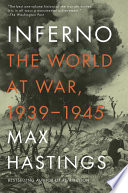
Inferno
The World at War, 1939-1945
فرمت کتاب
ebook
تاریخ انتشار
2011
نویسنده
Hanya Yanagiharaنویسنده
Hanya Yanagiharaنویسنده
Max Hastingsشابک
9780307957184
کتاب های مرتبط
- اطلاعات
- نقد و بررسی
- دیدگاه کاربران
نقد و بررسی

Starred review from August 8, 2011
Hastings continues a recent substantial body of general audience writing on WWII (Armageddon; Retribution,) in this equally well-researched and well-presented account focusing on the conflict’s human dimension, looking at both soldiers and civilians, members of both Allies and Axis. For millions of ordinary people the war was “hell let loose,” imposing, at the least, drastic change and, at worst, incomprehensible horror—60 million died. Participants assembled the “vast jigsaw puzzle” of war with the pieces they had and made sense of it in terms of their own circumstances. Hastings succeeds admirably in synthesizing the results in a globe-girdling context from Guadalcanal to the Dnieper River. He establishes, in some sense, the temporary nature of war—that soldiers seldom lost their identity as civilians in uniform, and civilians counted the days until normality returned. That mind-set determined the war’s nature: structured by mass participation and institutional effectiveness. In Russia, for instance, the German invasion led to “a surge of popular enthusiasm” to support Russia, followed rapidly by despair and men trying to evade the draft. As Hastings makes clear, the war’s impact also outlasted the conflict: for decades people judged one another by their wartime behavior; for many the psychological impact of the horrors never left them. Illus., maps.

Starred review from August 15, 2011
A World War II history by Hastings (Winston's War: Churchill, 1940–1945, 2010, etc.) may seem like a tautology, but readers familiar with his previous books will expect an enthralling account of his favorite subject. They will not be disappointed.
This time, the author emphasizes personal experiences as well as his often squirm-inducing opinions. Most startling—but not really controversial—he maintains that the Wehrmacht outclassed all other armies. The Allies, including the Soviets, never won a battle without vast superiority in men and material. However, he writes, the democracies were smarter. American industry operated more efficiently, took better advantage of science and paid more attention to logistics. German and Japanese troops regularly starved and rationed ammunition. In addition, U.S. intelligence services performed superbly, the enemies' dreadfully. Readers will perk up at Hastings' claim that Hitler's second greatest mistake, after invading Russia, was launching the Battle of Britain. If he had allowed Britain to stew for months after its humiliating defeat, Churchill would have had great difficulty sustaining national morale or fending off pressure to make a peace, which would have eliminated not only Britain but America as a threat. Most general histories sprinkle their pages with anecdotes, but Hastings has this down to a science. He employs numerous specialists, delving into Russian and Italian archives and personally tracking down obscure, vivid, often painful stories from the usual combatants as well as Poles, Bengalese, Chinese and Japanese.
Excellent general WWII accounts abound—including those by historical superstars such as Stephen Ambrose and John Keegan—but Hastings is matchless.
(COPYRIGHT (2011) KIRKUS REVIEWS/NIELSEN BUSINESS MEDIA, INC. ALL RIGHTS RESERVED.)

October 15, 2011
Former UK journalist Hastings (Retribution: The Battle for Japan, 1944-45), a popular war historian who has covered World War II from many perspectives, here relates what individuals in the armed forces and the home fronts on all sides experienced. He employs excerpts from mostly contemporary diaries and letters illustrating the shortages, sufferings, destruction, fear, and death that permeated lives violently upended by the all-consuming conflict. There are also passages that bring readers back to the big picture and what various leaders were doing, but it's the stories of what ordinary people experienced at such great cost that make this an engrossing book. VERDICT This well-written history is recommended for all readers and libraries. (Photos, maps, and index not seen.)--D.K.B.
Copyright 2011 Library Journal, LLC Used with permission.

October 1, 2011
Contemplate the human destruction of WWII: an estimated 60 million deaths, including 20 million Soviets, 6 million Jews, and 15 million Chinese. That comes to an average of 27,000 deaths for each day of war. Inevitably, these mind-numbing numbers swamp the countless stories of individual suffering. So this masterful account, which emphasizes the experiences of ordinary people, is both engrossing and necessary. Hastings, a former correspondent and newspaper editor, does not ignore political and military aspects, but the power of his narrative lies in the many recounted stories of soldiers and civilians on all sides and various fronts. Polish soldiers describe their shock and helplessness as they are overwhelmed by the blitzkrieg. A French officer remembers the demoralization and panic as Panzers breached his defenses. A young Chinese peasant conveys the pain and humiliation as she is repeatedly gang-raped by Japanese soldiers. This is a powerful portrait of a broken, burning world.(Reprinted with permission of Booklist, copyright 2011, American Library Association.)

























دیدگاه کاربران